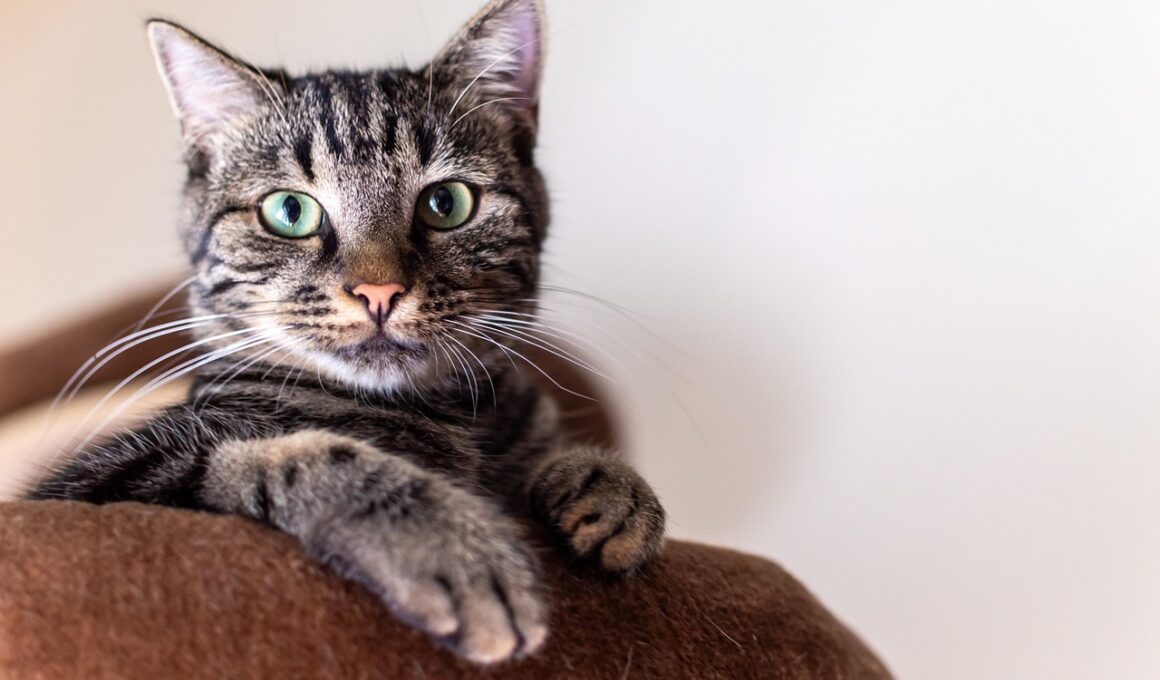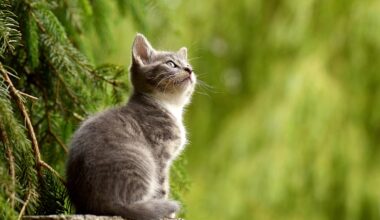How Fluctuations in Blood Sugar Affect Cat Irritability
Much like humans, cats experience behavioral changes that can be linked to the fluctuations in their blood sugar levels. Low blood sugar, or hypoglycemia, can lead to various symptoms, including irritability. Cats affected by this condition may display sudden mood swings, aggression, or withdrawal. This can result in a strained bond between the cat and its owner, causing frustration on both sides. To prevent these mood swings, it is essential to provide a balanced diet that maintains stable blood sugar levels. Additionally, feeding cats smaller, more frequent meals can help manage their energy levels and mood. Some cats may be more sensitive to these changes than others, so it’s crucial to observe their behavior closely. Owners should consult with a veterinarian for recommendations tailored to their pet’s specific needs. Recognizing the connection between diet and behavior in cats will lead to improved mental and emotional health. A holistic approach to caring for your furry friend can enhance their overall well-being, allowing for a happier and more harmonious home environment for everyone involved.
Research indicates that certain cat breeds may be more prone to blood sugar fluctuations and subsequent behavioral issues. For example, breeds such as the Siamese and Abyssinian may experience these fluctuations at a higher rate than others. It is essential for cat owners to monitor their pets and consult a veterinarian if they notice any concerning changes in behavior, especially if irritability becomes more frequent. Understanding your cat’s dietary needs is vital in preventing these issues. A diet rich in protein and low in carbohydrates can help stabilize blood sugar levels, keeping your feline friend happy and calm. Additionally, it is important to maintain a consistent feeding schedule tailored to your cat’s unique needs. Engaging in regular play sessions can also help manage your cat’s energy levels and ease any built-up tension. Always ensure access to fresh water and monitor their weight closely. Overweight cats may face more significant challenges with blood sugar fluctuations. By focusing on balanced nutrition and appropriate exercise, you can foster a more stable mood in your cat, promoting a happier and healthier lifestyle.
Identifying Signs of Irritability in Cats
As a cat owner, recognizing the signs of irritability in your feline companion is critical for intervention. Common indicators include hissing, swatting, tail twitching, or a sudden desire for solitude. These behaviors often signal that your cat may be experiencing discomfort due to fluctuating blood sugar levels. Changes in eating patterns, such as increased or decreased appetite, can also be a warning sign. Pay attention to any changes in your cat’s grooming habits, as excessive grooming might indicate stress or agitation. Maintaining a detailed record of your cat’s mood and behavior can offer valuable insights and help identify patterns related to their nutrition and health. If abrupt changes in behavior are noticed, it is wise to consult with a veterinarian for advice. They can assess whether these behavioral traits stem from nutritional deficiencies or health problems. Recognizing these signs early can lead to appropriate interventions that enhance your cat’s quality of life. Understanding the emotional language of your cat can empower you as a caregiver, fostering greater connectivity and healthier interactions.
The role of nutrition in maintaining stable blood sugar levels cannot be overstated. A well-balanced diet that meets your cat’s metabolic needs is crucial for preventing irritability. High-quality cat food should be rich in nutrients and protein and low in simple carbohydrates. Cats are obligate carnivores, meaning they thrive on a diet primarily composed of meat. Choosing a diet that mimics their natural food source can result in fewer blood sugar spikes and crashes. Additionally, consider incorporating supplemental omega-3 fatty acids, which have been shown to support brain health and may help stabilize mood in cats. Furthermore, avoid giving your cat excessive treats, especially those high in sugar. This can disrupt their dietary balance and lead to irregular blood sugar levels. Always consult with a veterinarian to determine the best dietary plan for your cat. Regular check-ups can ensure that nutritional adjustments keep pace with your cat’s evolving needs. By taking a proactive approach to your cat’s diet, you can significantly reduce the risk of irritability that arises from blood sugar fluctuations.
The Importance of Regular Veterinary Check-ups
Regular veterinary visits play a pivotal role in monitoring your cat’s health, particularly regarding nutrition and blood sugar levels. During these check-ups, a veterinarian can conduct routine blood tests to assess glucose metabolism and identify any potential health issues early. This proactive approach allows for timely interventions that can enhance your cat’s quality of life. If irritability and behavioral changes are noted, discussing these concerns during veterinary visits can lead to recommended dietary changes or additional tests. Moreover, vets can provide tailored advice on diet modification to keep blood sugar levels stable while reducing behavioral issues. Maintaining open communication with your veterinarian will empower you as a cat owner. By sharing observations regarding your cat’s behavior and eating habits, you help create a more comprehensive health profile. Follow-up appointments are essential for reassessing your cat’s health and nutrition strategy. Keeping vaccinations and preventive care up to date ensures your kitty stays in optimal condition for years to come. Regular vet visits represent an investment in the long-term well-being of your beloved feline companion.
Adopting lifestyle changes can make a significant difference in your cat’s mood and day-to-day behavior. Creating a consistent routine allows your cat to develop a sense of security, minimizing stress that can lead to emotional volatility. This includes regular feeding times, play sessions, and even cuddle time. Play is essential for channeling energy and reducing irritability. Interactive toys and games can help stimulate both the mind and body. Setting aside time each day to engage in play fosters a bond between you and your cat, enhancing trust and connection. Moreover, creating a serene environment at home can reduce overall stress levels. Designate quiet spaces where your cat can retreat when overwhelmed. Vertical spaces such as cat trees and shelves can provide a sense of safety and autonomy. Incorporate scratching posts and cozy bedding to encourage a positive atmosphere. By establishing a cat-friendly environment, your feline companion will likely experience less irritability overall. These adjustments can create a ripple effect, showcasing how lifestyle changes translate to a happier, more well-behaved cat.
Conclusion: Nutrition and Behavior in Cats
In conclusion, understanding the impact of nutrition on your cat’s behavior is essential in promoting a tranquil and enjoyable home environment. Fluctuations in blood sugar can lead to irritability, affecting the bond between cats and their owners. By maintaining a well-rounded diet, recognizing signs of stress, and incorporating regular vet visits, cat owners can effectively manage their pet’s behavior. Ensuring that your feline receives the right nutrients fosters a stable mood, while providing a consistent routine and engaging environment further enhances their emotional health. Monitoring your cat’s reactions to dietary changes is also invaluable in navigating their unique needs. Collaborating with a veterinarian on a tailored nutrition plan can yield the best results for behavioral stability. Additionally, listen to your cat’s non-verbal cues to remain attuned to their emotional well-being. As you foster a deeper understanding of your pet’s needs, their happiness will reflect within the household. Ultimately, caring for your feline friend through a holistic approach strengthens your relationship and enriches their life experience.
This is a concluding message encouraging you to apply what you’ve learned about cat nutrition and behavior. Armed with this knowledge, you can create a healthier lifestyle for your feline friend.


